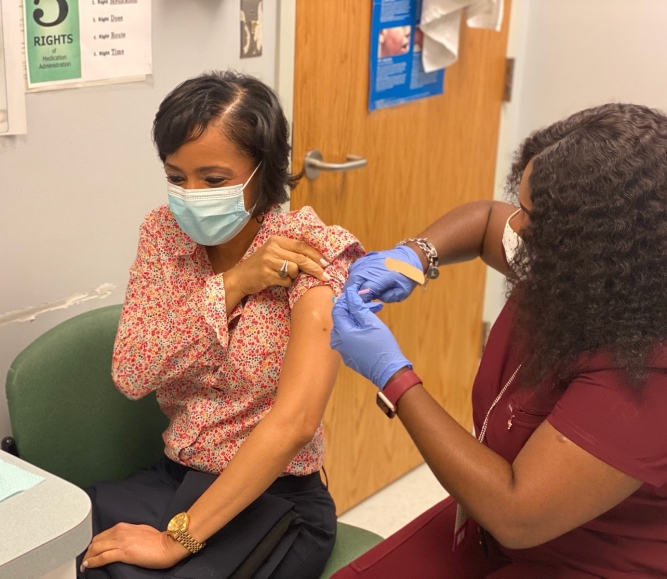Fall vaccines: Why they are important and how county leaders can support uptake

Key Takeaways
What vaccines are recommended this fall, and for who?
Respiratory virus season is quickly approaching, which means that now is the ideal time to vaccinate against the latest variants of common respiratory viruses. Updated flu and COVID-19 vaccines are available and recommended for everyone 6 months of age and older, and individuals can receive both vaccines in the same visit. Both vaccines are proven to protect against severe illness, hospitalization, and death.
RSV (respiratory syncytial virus) vaccines are still recommended for older adults ages 65 and above. The RSV is not an annual vaccine, so only older adults who have never received an RSV vaccine are eligible.
What should county officials know about these vaccines?
The spread of false rumors about vaccines has led some people to think that vaccines are not safe. This is not true. The new flu and COVID-19 vaccines have gone through an extensive, standardized testing process and are safe and effective. They are the most powerful tool available to protect individuals from severe illness, hospitalization, and death.
Bottom line: encouraging people to get vaccinated can help reduce sick leave, missed school, high medical bills, and even death in your community this winter.
What can county officials do to encourage people to get vaccinated this fall?
Many elected officials leverage their own annual vaccine appointment to publicize the safety and importance of getting vaccinated. Inviting media to accompany you and take photos is one way to broadcast your support for vaccination efforts. Receiving the vaccines at your county health department, too, can help promote any vaccine clinics or events your local health department may be planning.
Given the recent polarization around vaccines, the de Beaumont Foundation conducted message testing with groups across the political spectrum to better understand the most effective ways to encourage everyone to get vaccinated. Below are some tips for county officials to use when communicating with colleagues and constituents about vaccines:
- Lead with the scientific rigor of vaccine development: Emphasizing that each vaccine goes through an extensive, standardized testing process to ensure safety and efficacy — even during an emergency — helps put people’s minds at ease about vaccine safety.
- Remind people about the seriousness of the illnesses that vaccines can protect against: Vaccines help prevent illnesses with potentially serious effects, such as cancer, pneumonia, blindness, deafness, and even death. Reminding people of these consequences can be a powerful motivator to get vaccinated.
- Explain the long track record of vaccine effectiveness: Vaccines have a proven track record of reducing and eradicating diseases that were once very common and caused serious illness or death. The polio vaccine, for example, developed in the 1950s, has reduced polio cases worldwide by more than 99%.
- Empower people to make their own health decisions: Individuals will ultimately decide whether to get vaccinated, and people respond well to vaccination messaging when they feel their personal freedom is acknowledged and respected. Reminding people that they are the ultimate decision-makers about their vaccine plan and encouraging them to review trusted sources communicates that you genuinely have the community’s best interest in mind.
County News
Overcoming vaccine hesitancy requires two-way communication

Related News

Drug tracking software helps counties identify trends, save lives
Florida counties are using an artificial intelligence tool called Drug TRAC to track and report drug trends, with the aim of providing quicker outreach and saving lives.

White House Executive Order establishes national substance use disorder response
On January 29, the White House issued an Executive Order (EO) establishing the Great American Recovery Initiative, a new federal effort aimed at coordinating a national response to substance use disorder (SUD).

USDA and HHS release new dietary guidelines
On January 7, U.S. Department of Agriculture Secretary Brooke Rollins and U.S. Department of Health and Human Services Secretary Robert F. Kennedy, Jr. unveiled the new Dietary Guidelines for Americans, 2025–2030.
